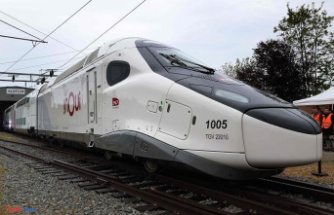Commodity prices are currently skyrocketing due to the war in Ukraine. Not only oil and gas are affected, but also fertilizers, which are so important for agriculture. In the potash deposit in Thuringia, investors see a source of raw materials that would not only be of interest for the domestic market.
Getting raw materials from a depth of 700 meters - in Germany? Somehow, in times of coal phase-out and digitization, mining has a touch of the past. But that could change soon, experts say. "There is a rethink." High raw material prices, bottlenecks not only in gas due to the Russian war of aggression in Ukraine and increasing global demand made domestic raw materials interesting for construction, industry, agriculture and the energy transition. Probably one of the largest projects: In Thuringia, a potash deposit for fertilizer production is to be newly developed.
We are talking about a potash mine that, according to the plans of the Australian exploration company South Harz Potash Ltd. 620 million US dollars (623 million euros) should flow. She has bought mining licenses for the Ohm Mountains and other areas in northern Thuringia. According to its regional director, Babette Winter, around five million euros have so far been invested in two promising exploratory wells near Worbis and Haynrode. It's about potassium chloride for mineral fertilizers. If the company's concept, presented in August, works out with the German subsidiary Südharz Kali GmbH, it would probably be the first new mine of this size in Germany for decades.
According to the study by South Harz Potash, there is a mineable supply of potash salt of more than 134 million tons in the Ohm Mountains alone - raw materials for decades. A location decision should be made by the end of this year, says Winter. The construction of the shafts to a depth of more than 700 meters and a plant could be expected in 2026/2027 in view of the complex approval process. "There is a new perspective!" tweeted Thuringia's Prime Minister Bodo Ramelow from the left when the study was available in August.
Germany, which is considered to be rather poor in raw materials, is already a major player in the potash market with the fertilizer producer K S AG (Kassel), which is listed in the MDax, and mines in the Hessian-Thuringian border area on the Werra and in Zielitz in Saxony-Anhalt. "Potash production in Germany is in fourth place in the world, almost ten percent of world production," explains Helmut Mischo, a professor for raw material extraction in Freiberg. "To date, only a small part of the reported reserves has been mined." Mischo from the TU Bergakademie Freiberg, but also Joachim Ragnitz from the Ifo Institute in Dresden, point to market shifts in fertilizers due to the war in Ukraine. "The prices have risen massively," says Ragnitz. Alongside Canada, Russia and Belarus are the world's largest fertilizer producers - although they are now cut off from parts of the market.
At the same time, the demand for fertilizer in agriculture is growing with the increase in world population, said Mischo. "These are two independent but overlapping processes." Ragnitz says that potential investors in the southern Harz are apparently assuming that fertilizer prices will remain high in the long term. So Südharz Kali GmbH would be something like a "war profiteer"? No, says Winter. "We acquired the mining license back in 2017." According to the results of the test drilling, the study rated the deposit as "extremely profitable".
Winter is currently on the road a lot in northern Thuringia. She explains the project, in which, according to her, overburden and saline waste water are to be brought back into the underground cavities. Many, she says, have "a positive, inquisitive mood." After all, the major mining project is to be implemented in a region with a long potash tradition.
After reunification, several potash mines were closed in northern Thuringia. Miners at the Bischofferode potash plant made headlines around the world in 1993 with a months-long labor dispute and hunger strike. Irony of history: The deposit that is to be mined is right next to the Bischofferode pit, which was closed by the Treuhand, has since been flooded with saline lye and can no longer be used. Gerhard Jüttemann, one of the protagonists of the labor dispute 30 years ago and chairman of the local potash association, is hoping for a positive outcome of the project. "We already said back then that we have the highest quality deposit in Europe." The region could benefit from a revival of potash mining. "I have a good feeling about that."












